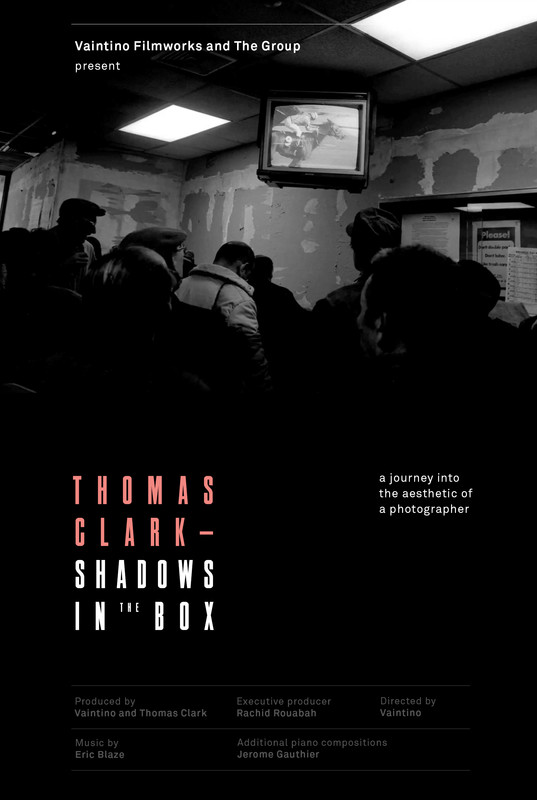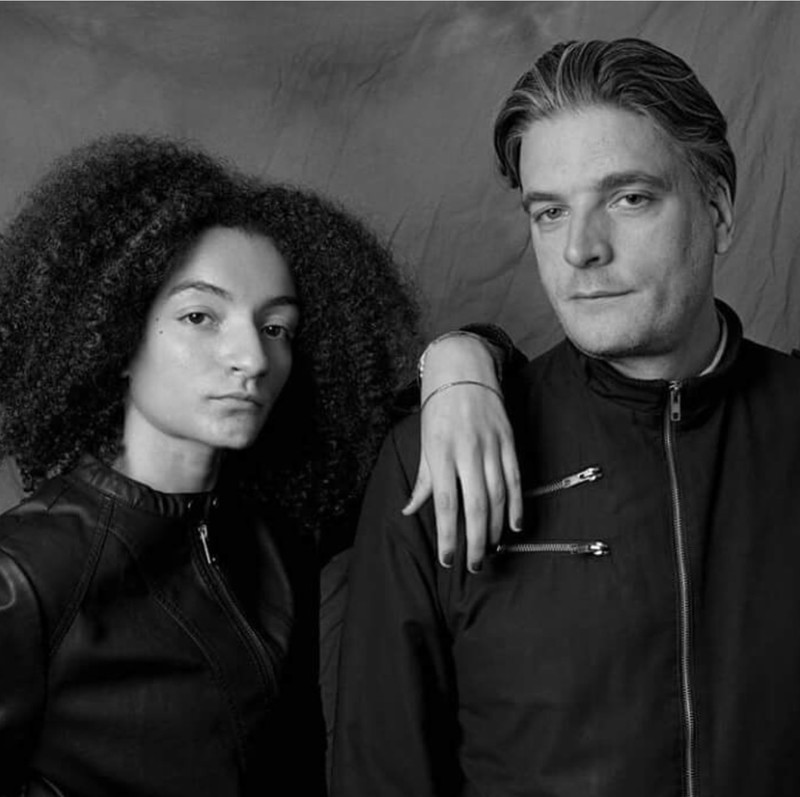Vaintino
Emmanuel Martin Di feliciantonio (Vaintino) is a Paris born New Yorker. In 1990, he enrolled at Paris 8 university, then featuring the most renowned MFA immersive film program. He studied under the tutelage of prestigious luminaries from the french new wave, and Cahiers du cinema legends; master craftsman Jean-Henri Roger (1949-2012)(wikipedia in English) personally recognized early signs of Emmanuel's creativity and mentored him into producing, writing and directing his first short film in march of 1991, titled "Urban poetry", a social satire about art. Bitten by the bug, he kept on writing and directing his own screenplays and plays, studied acting, in a director's capacity, at the popular studio Andreas Voutsinas (Wikipedia in English). Eventually, he expanded to the music business, that led him to manage "Dis Bonjour a La Dame" a local acid jazz band. Emmanuel was able to get the band to open for Jamiroquai at the Bataclan, and Maceo Parker, at the Olympia, respectively in June and July of 1993, securing in the process a record deal with East/West/Warner. Then, Emmanuel joined forces Action Gitanes (Wikipedia in English), the most revered independent Theatrical distribution of Indies and Hollywood classics in Paris. On his first trip to New York, in September 1995, Emmanuel engineered the purchase of the theatrical and video rights for distribution in France of "The Addiction" by legendary King of New York's director, Abel Ferrara. That adventure spare headed a definite move to Brooklyn, New York, that year.
Emmanuel has been living in the Crown Heights, Bed-Stuy area since then. As it was at the time, a lot of creative people were dwelling in the area, mostly known for the neighborhood where Notorious BIG sprang from. Emmanuel, was, himself, raised in the housing system in Paris by Irene, his mum, an home maker/piano teacher from Italian descent and by his dad Paulino (1941-1996), a Spanish born factory worker. Indeed, he was used to that kind of eclectic urban environment that Brooklyn had to offer and felt right at home. He set up a music studio and developed different local talents in a Spartan like one bedroom apartment on Dean street. He got all the inspiration he needed to eventually start writing and document his path through visual expression, documentation, and narratives. A trilogy was born on the page, "The Curator", an art heist caper, "Swans in the Dark", a neo noir international gangster film, and "Lionel Fantom in room ninety-nine", a psychological drama about a D.J. Socially, Emmanuel also nurtured special relationships with New York artists, culminating in the presentation of his visual installation "Solo High part 1 and 2" about abstract painter Tom Ryan, at downtown members only clubs, Norwood and the Soho House. Earlier, Emmanuel had experienced special exposure when he screened another one of his documentaries in February 2003, titled "A summer in The life of Ernest Rosenberg", a Soho street artist, at legendary and now defunct Amy Sacco's Lot 61.
Consequently, Emmanuel Martin Di Feliciantonio (Vaintino), wrote more screenplays, plays, series pilot, and directed features, videos and developed his own personal aesthetic revolving around installations, events, and curated screenings as well as art projects. Lately, in the spring of 2016, he co-created the Bed Stuy theater group with a local actor, Kevin Leonard, and directed August Wilson's "Ma Rainey's Black Bottom" in the August in August summer series in Fulton Park and James Baldwin's "Blues for mister Charlie", at the black caucus in Albany, in February 2017, both events were historical premiere, co sponsored by the counsel for the arts in Brooklyn. Vaintino, also completed a feature film titled "An Afternoon in Monte Carlo" (Amazon prime-UK) and a feature documentary titled "Shadows in the Box"(tubi , prime tv) for his own production company vaintinofilmwork
Your project has entered in our festival. What is your project about?
"shadows in the box" is about the aesthetic journey of a street photographer, Thomas Clark, a new York native. An African-American boomer, born and raised in queens , St Albans to be exact.
Emmanuel has been living in the Crown Heights, Bed-Stuy area since then. As it was at the time, a lot of creative people were dwelling in the area, mostly known for the neighborhood where Notorious BIG sprang from. Emmanuel, was, himself, raised in the housing system in Paris by Irene, his mum, an home maker/piano teacher from Italian descent and by his dad Paulino (1941-1996), a Spanish born factory worker. Indeed, he was used to that kind of eclectic urban environment that Brooklyn had to offer and felt right at home. He set up a music studio and developed different local talents in a Spartan like one bedroom apartment on Dean street. He got all the inspiration he needed to eventually start writing and document his path through visual expression, documentation, and narratives. A trilogy was born on the page, "The Curator", an art heist caper, "Swans in the Dark", a neo noir international gangster film, and "Lionel Fantom in room ninety-nine", a psychological drama about a D.J. Socially, Emmanuel also nurtured special relationships with New York artists, culminating in the presentation of his visual installation "Solo High part 1 and 2" about abstract painter Tom Ryan, at downtown members only clubs, Norwood and the Soho House. Earlier, Emmanuel had experienced special exposure when he screened another one of his documentaries in February 2003, titled "A summer in The life of Ernest Rosenberg", a Soho street artist, at legendary and now defunct Amy Sacco's Lot 61.
Consequently, Emmanuel Martin Di Feliciantonio (Vaintino), wrote more screenplays, plays, series pilot, and directed features, videos and developed his own personal aesthetic revolving around installations, events, and curated screenings as well as art projects. Lately, in the spring of 2016, he co-created the Bed Stuy theater group with a local actor, Kevin Leonard, and directed August Wilson's "Ma Rainey's Black Bottom" in the August in August summer series in Fulton Park and James Baldwin's "Blues for mister Charlie", at the black caucus in Albany, in February 2017, both events were historical premiere, co sponsored by the counsel for the arts in Brooklyn. Vaintino, also completed a feature film titled "An Afternoon in Monte Carlo" (Amazon prime-UK) and a feature documentary titled "Shadows in the Box"(tubi , prime tv) for his own production company vaintinofilmwork
Your project has entered in our festival. What is your project about?
"shadows in the box" is about the aesthetic journey of a street photographer, Thomas Clark, a new York native. An African-American boomer, born and raised in queens , St Albans to be exact.

What are your ambitions with your project?
At first, my ambition was to celebrate a great friend and to my eyes , an unsung world class photographer , who needed to drum up some kind of worldwide exposure to secure a legacy that he undertook to explore five decades ago. As you re probably aware, themes around race and culture are always used nefariously to undermine the talent of some individuals not belonging to the privileged class. i think a little bit if justice I was seeking as well, with the making of this documentary.
Tell us something about your shooting? What pleasantly surprised you?
As I started shooting the film, I quickly realized that this will be different in an existential fashion. As the days, interviews and walks rolled by, it became clear to me that i was a witness of much more than a skilled artist at work, but more like a man exposing a range within a full experience about beauty and life at large. As we gathered shots, I started focusing on the force underlying this whole experience, love itself. I did not focused on the technical aspects of film making. It came with it.
For what group of spectators is your film targeted?
Everyone
Why should distributors buy your film?
I have digital distribution, a google search updates the new platforms .
How would you specify your work? What characterizes your film?
I would answer that the main difference
With my documentary from others in the same genre resides on the storytelling itself. I got tired of watching a third party sing the praises of someone else that s not in the room and then b roll to another third party telling me the same thing over images. It turns out, the ego turns me off and i didn't t want to make a run of the mill type of documentary. I wanted to express the real. Existing and manifesting around Thomas Clark shaped my quest in the making of " Shadows in the box". All interviews were impromptu and not planned, and all exchanges were as the journey took place that day. I wanted everything to happen and move as a true quantum experience, on to transcend the artist s destination all day, everyday, till the documentary ended organically.
Why did you decided to become a filmmaker?
filmmaking came around really early in my life, as I was dwelling into multiple aspects of creativity. Music came first, with detecting a strong sense of melody and rythmn inside myself. I hesitated between seriously studying sound engineering but Couldnt find the appropriate program in Paris back then, so I went straight into film studies, right after my economic and social studies. The rest is me now thirty four years later, still at it.
Who is your role model?
I always stayed away from ego worshiping, I m more inclined to be inspired by a whole vibe, a true divine expression on a higher frequency, if it could be understood as such a desire for a more transcending expression as a true artistic source or compass.
Which movies are your favorites? Why?
different periods of film history got my attention. Honestly speaking, from the golden age till now I m trying to keep an open mind. I m totally a student of the craft and seek a reference point for every creative endeavor that I undertake. I champion to the youth every time I can the importance of knowing your craft s history and draw from it. We all are responsible for the cultural survival of our species. The mavericks got my respect , again no name needed to mention here.
Where do you look for inspiration for your films?
Life itself as the struggle between the light through the dark.
Which topics interest you the most?
Transcending the banal and bringing in a new mechanism through the lense, as to read another form of reality where the editing of time, light and space would introduce a subject and its possibilities. My favorite themes are dreams and desires and all that impede them in this reality, but allow them to exist on a cinematic dimensional plane of study.
What do you consider your greatest achievement in your career?
that i m still living the journey.
What do you consider most important about filming?
the act of filming is made as the first stroke. Like the primordial artist in the cave. The legacy of the human soul, a map to our transcendence as conscious beings, whose journeys matter the most as our mortality becomes realer to us.
Which film technique of shooting do you consider the best?
I never bother with anything "technical" it comes to me when needed.
How would you rate/What is your opinion about current filmmaking?
I Don t rate. It s exactly at the opposite of my whole life philosophy.
What can disappoint you in a movie?
I m generally lucky. I watch films that are calling me for some reason. So I m rarely disappointed
Who supports you in your film career?
My creator. Please Don t let go, lol.
